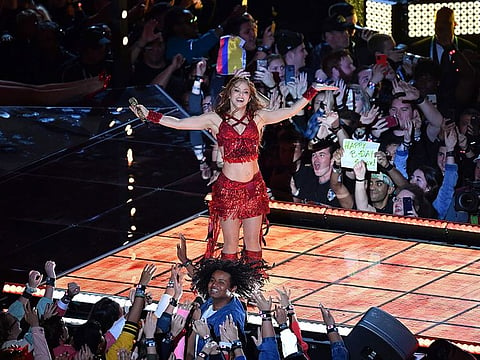No one knew what Shakira's Super Bowl zaghrouta was. No wonder.
Zaghrouta a chant often raised in the Middle East and North Africa at moments too joyful

Sunday night's Super Bowl was full of twists, turns and a historic comeback for the ultimately victorious Kansas City Chiefs. But only one moment got me on my feet.
In the middle of the halftime show, the singer Shakira let loose a stadium-shaking wail, high-pitched and accompanied by her tongue flicking up and down. I leaped from my couch, shrieking, too.
The Grammy-winning artist, who is half Lebanese, was letting loose a zaghrouta, a chant often raised in the Middle East and North Africa at moments too joyful to celebrate otherwise.
If you've ever been to an Arab wedding, you've probably heard such an ululation. If you're related to anyone like my late grandmother, you heard it before you went off to prom, when you aced your final exams and when you returned home after a long trip away. Call it a "yeehaw," a "yaaass," a "hallelujah" - whatever suits you best.
Granted, Shakira didn't do her zaghrouta very well; you're typically supposed to place your hand horizontally atop your mouth, so as to minimize some of that visual tongue action. But it was still refreshing to see. What wasn't refreshing was how perplexed people were by her homage to her Lebanese roots.
Twitter was immediately flooded with memes of the moment, mostly making unflattering comparisons, particularly to turkeys, SpongeBob SquarePants and even sexual acts. The confusion surrounding the act, whose origin dates to the pre-Islamic era, was understandable. It's a symptom of the West's broader problem of poor representation of Arab and Middle Eastern life.
For once, an Arabic expression of utter delight, not the violent stereotypes that plague American TV and movies, was on one of our biggest national stages. And next to no one recognized it.
The Census Bureau estimates that 1.9 million Americans are of Arab descent. The Arab American Institute Foundation puts that number at 3.7 million. Yet, to the general population, Arabs are at best mysterious, and at worst malicious. Historically, Arabs have been portrayed in media as villains and terrorists, the men as misogynists and the women as submissive and exotic.
A few pieces of culture - the Egyptian American family dramedy "Ramy" comes to mind - have taken steps toward accurate, nonwhite-washed representation. But for the most part, the malignant stereotypes persist, on-screen prejudices that affect both my fellow Arabs and the rest of the country who are denied real glimpses into our culture.
That's why it's crucial for these niche, joyful moments to have a platform. It feels good to know that you are seen when you so often aren't. But it can become a moment to educate others, too.
When I explained what Shakira's "tongue thing" was to my friends, they wanted to learn more. We queued up YouTube videos of zaghroutas at weddings and marveled at the vocal virtuosity. I even tried to show my friends how to produce the sound; suddenly, I was commiserating with Shakira's less-than-perfect attempt.
I loved explaining this piece of my culture, but I wished at the same time that something so commonplace from my upbringing would be more easily recognized in the United States.
So I'm thankful to Shakira (whose name comes, by the way, from the Arabic for "grateful") for briefly bringing Lebanon to the Super Bowl stage with all her ululating and belly dancing, to boot. Her halftime performance was a call for Arabs abroad not to minimize our joy. And it was a call, too, for the rest of America to take the time to understand that, while it sounds a bit different, our joy is the same as theirs.
Sign up for the Daily Briefing
Get the latest news and updates straight to your inbox





